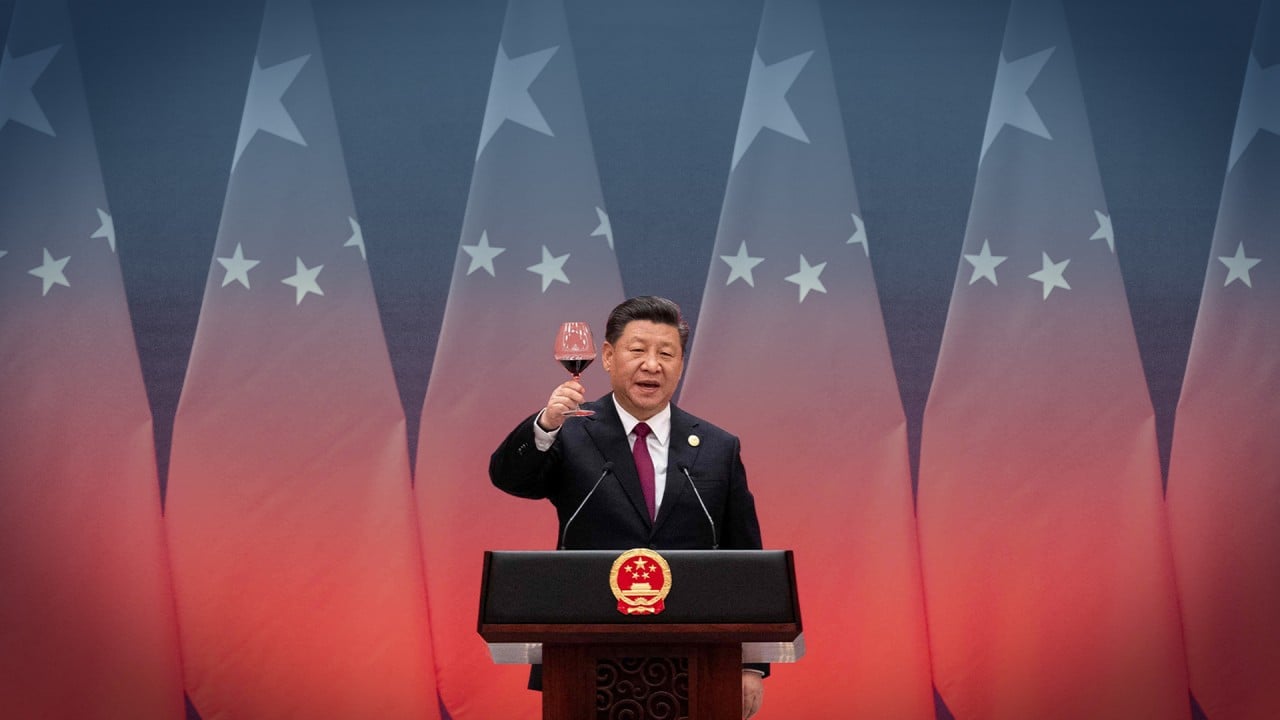
How revised Chinese law makes Shanghai party chief a hot candidate for role of premier
- Leading the race for China’s next premier is Shanghai party boss Li Qiang, but he has never served as vice-premier, as tradition demands
- That hurdle may be overcome if Li is named as a vice-premier by the NPC Standing Committee, invested with the power to do so by a 2021 law revision
Xi, who is on the cusp of a record-breaking third term as paramount leader, understandably wants to build a young team able to support him for the next five years and beyond.
Sources said Li Keqiang, 67, would opt for full retirement instead of staying on in the seven-member Politburo Standing Committee – the party’s top decision-making body – and taking up another state position.
The choice of his replacement would hinge on the fate of his committee colleague Wang Yang, who is of the same age – as age still matters when Beijing decides whom to retain and whom to let go.
Wang, chairman of the Chinese People’s Political Consultative Conference, is viewed by overseas observers to be an ideal candidate, given his rich experience and background.
Ranked No 4 in the party hierarchy and a former vice-premier, Wang is also the logical choice to take over from Premier Li if he transitions to the new Politburo Standing Committee, to be revealed at the end of the congress.
What Xi Jinping’s shortened congress work report did not mention
However, various sources now say Wang is more likely to follow Li Keqiang into full retirement, which would throw the race wide open for the position of premier.
Shanghai boss Li Qiang, 63, is among a group of rising stars likely to make it to the Politburo Standing Committee.
Historically, Shanghai has long been a breeding ground for top national leaders. With the exception of the disgraced Chen Liangyu, who was brought down by a corruption investigation launched by Xi’s predecessor Hu Jintao, all Shanghai party chiefs have made it to the Politburo Standing Committee in the last 33 years.
Sources said that Li Qiang, who has a strong track record in developing technology and the new economy, also leads the race to become the new premier.
However, one thing going against him is party tradition. Only Zhou Enlai and Hua Guofeng had been directly promoted to premier without first serving as vice-premier. Zhou was a founding father of the People’s Republic of China, and Hua was Mao Zedong’s anointed heir.
All others have been required, by unwritten custom, to first serve as vice-premier before they can take up the role of premier.
But this is not likely to be a major hurdle for Xi. While the president largely follows customary rules, he is not shy to bend them – if doing so is seen to fit a greater purpose.
Theoretically, Li Qiang could be made a vice-premier in the next few months by the National People’s Congress (NPC) Standing Committee, which now has the power to do so after a law revision last year.
Bigger-than-expected changes loom as Xi shapes China’s top leadership
He could then be appointed premier in March, when the NPC holds its full session.
When China revised its NPC organisation law in March 2021, it added that the NPC Standing Committee, at the request of the premier, could appoint or dismiss senior officials in the State Council – including the vice-premier – before the annual parliamentary sessions.
While Li Qiang has solid local governance experience, he has never served as vice-premier. But the revised law would provide a solution for Xi to circumvent convention.
Panic buying of bottled water grips Shanghai as taps run dry in 10 areas
Until that debacle, however, Shanghai had garnered praise for its “scientific and comprehensive Covid-19 prevention strategy”, which saw the city emerge largely unscathed from the global pandemic through 2020 and 2021.
A senior medical expert in Shanghai, speaking on condition of anonymity, said it seemed in hindsight that Li “may have hesitated for too long to issue the district-level lockdowns and missed the opportunity to stop the virus from spreading”.
But he said few people at the time fully understood just how transmissible the Omicron variant was, and Shanghai authorities feared the costs to the national economy if they were to overreact.
“To be fair to [Li], throughout 2020 and 2021, before the emergence of Omicron, Shanghai had kept a good balance between virus control and economic development,” the medical expert said.
Other rising party stars who may be elevated to the Politburo Standing Committee include Xi’s trusted political aide Ding Xuexiang, 60, Guangdong party secretary Li Xi, 66, and Chongqing party chief Chen Miner, 62.
Vice-Premier Hu Chunhua, 59, and propaganda chief Huang Kunming, 65, are seen to have an outside chance.
While the new premier will only be formally named at the annual parliamentary sessions next March, the new order of party hierarchy, to be announced on Sunday, will offer the clearest clue.
Traditionally, the premier’s position is reserved for the No 2 or 3 in the party hierarchy. The holder of the office, who is in charge of China’s economy and social development, usually needs to have administrative experience in two major provinces and show a strong track record of economic development.
Under Xi, the most powerful Chinese leader after Deng Xiaoping, a good rapport with the president is also expected to be a critical factor for the new candidate.


